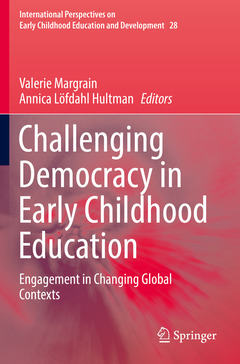Challenging Democracy in Early Childhood Education, 1st ed. 2019 Engagement in Changing Global Contexts International Perspectives on Early Childhood Education and Development Series, Vol. 28
Coordonnateurs : Margrain Valerie, Löfdahl Hultman Annica

Illustrates important concepts of democracy through the lived experience of children
Questions cultural assumptions around democracy through critical reflection on research and practice from five continents
Addresses contemporary global challenges such as migration, inclusion and sustainability
Date de parution : 08-2020
Ouvrage de 274 p.
15.5x23.5 cm
Disponible chez l'éditeur (délai d'approvisionnement : 15 jours).
Prix indicatif 147,69 €
Ajouter au panierDate de parution : 07-2019
Ouvrage de 274 p.
15.5x23.5 cm
Disponible chez l'éditeur (délai d'approvisionnement : 15 jours).
Prix indicatif 147,69 €
Ajouter au panierMots-clés :
childhood citizenship; diverse; democratic and pluralistic perspectives on ECE; parent-teacher communication; ethics and democracy in child research; comradeship and friendship of migrant children; toddler mathematics; negotiating inclusion into social groups in early childhood; bilingual communicative events; humanities as lived childhood experience; global connectedness and child engagement with ICT in ECE; challenging curriculum discourse and rights; lived experiences of gifted children and families; int



